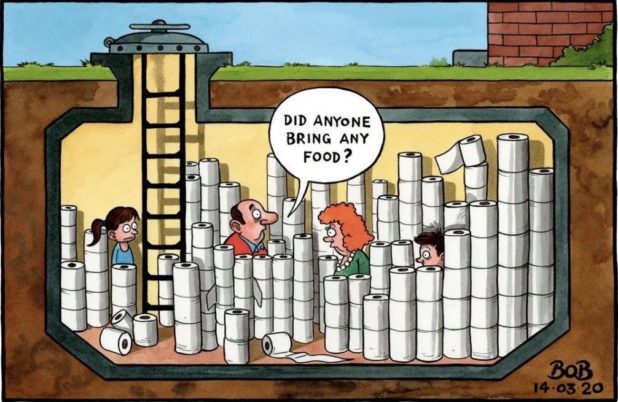Pomidor Quixote
Daily Stormer
March 26, 2020
Evil countries are trying to secure food for their own people.
This kind of food nationalism should have stopped after the Jews were cooked in ovens by the Evil Cannibal Nazis.
Now Culinary Nazism is resurrecting.
It’s not just grocery shoppers who are hoarding pantry staples. Some governments are moving to secure domestic food supplies during the conoravirus pandemic.
Kazakhstan, one of the world’s biggest shippers of wheat flour, banned exports of that product along with others, including carrots, sugar and potatoes. Serbia has stopped the flow of its sunflower oil and other goods. Russia is leaving the door open to shipment bans and said it’s assessing the situation weekly.
To be perfectly clear, there have been just a handful of moves and no sure signs that much more is on the horizon. Still, what’s been happening has raised a question: Is this the start of a wave of food nationalism that will further disrupt supply chains and trade flows?
“We’re starting to see this happening already — and all we can see is that the lockdown is going to get worse,” said Tim Benton, research director in emerging risks at think tank Chatham House in London.
Though food supplies are ample, logistical hurdles are making it harder to get products where they need to be as the coronavirus unleashes unprecedented measures, panic buying and the threat of labor crunches.
Consumers across the globe are still loading their pantries — and the economic fallout from the virus is just starting. The specter of more trade restrictions is stirring memories of how protectionism can often end up causing more harm than good. That adage rings especially true now as the moves would be driven by anxiety and not made in response to crop failures or other supply problems.
It’s not the economic fallout “from the virus” but the economic fallout from the stupid way in which most governments responded to it.
It’s almost as if they literally encouraged panic.
Some nations are adding to their strategic reserves. China, the biggest rice grower and consumer, pledged to buy more than ever before from its domestic harvest, even though the government already holds massive stockpiles of rice and wheat, enough for one year of consumption.
Key wheat importers including Algeria and Turkey have also issued new tenders, and Morocco said a suspension on wheat-import duties would last through mid-June.
As governments take nationalistic approaches, they risk disrupting an international system that has become increasingly interconnected in recent decades.
Kazakhstan had already stopped exports of other food staples, like buckwheat and onions, before the move this week to cut off wheat-flour shipments. That latest action was a much bigger step, with the potential to affect companies around the world that rely on the supplies to make bread.
For some commodities, a handful of countries, or even fewer, make up the bulk of exportable supplies. Disruptions to those shipments would have major global ramifications. Take, for example, Russia, which has emerged as the world’s top wheat exporter and a key supplier to North Africa.
“If governments are not working collectively and cooperatively to ensure there is a global supply, if they’re just putting their nations first, you can end up in a situation where things get worse,” said Benton of Chatham House.
Yes, nationalism is bad. Governments must put other nations first, because if they put their own nation first, bad things will happen to foreigners whose governments don’t put them first.
Every country must put other countries first, because by doing that, some other country will eventually put them first.
This is why Diversity is Our Strength.
He warned that frenzied shopping coupled with protectionist policies could eventually lead to higher food prices — a cycle that could end up perpetuating itself.
“If you’re panic buying on the market for next year’s harvest, then prices will go up, and as prices go up, policy makers will panic more,” he said.
And higher grocery bills can have major ramifications. Bread costs have a long history of kick-starting unrest and political instability. During the food price spikes of 2011 and 2008, there were food riots in more than 30 nations across Africa, Asia and the Middle East.
“Without the food supply, societies just totally break,” Benton said.
Maybe countries assuming that they could depend on other countries in order to fulfill basic needs was a mistake.
Now people are going to end up eating toilet paper soup.



